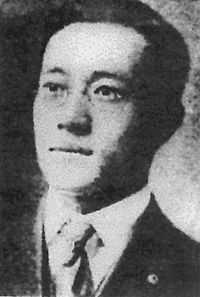Wang Zhengting

Wang Zhengting (Chinese: 王正廷; pinyin: Wáng Zhèngtíng; Wade–Giles: Wang2 Cheng4-t'ing2, known in English as C. T. Wang; 7 September 1882 – 21 May 1961) was a diplomat in the Republic of China (ROC). Wang was born in Fenghua, Zhejiang, and his father was a Methodist minister just outside Shanghai, where Wang attended mission schools before entering the preparatory school for the Peiyang University. After teaching in the Provincial High School in Changsha, Hunan. Wang studied in Tokyo, where he was secretary of the Chinese YMCA, then in 1907, went to the United States to study law at the University of Michigan. He soon transferred to Yale University, graduating in 1910 and being elected to Phi Beta Kappa. He returned to Shanghai in June, 1911, and took another position with the YMCA before being recruited to join the new Republican government in Beijing, then in Sun Yat-sen's opposition government in Canton.[1]
He served as a Chinese delegate under Wellington Koo during the Paris Peace Conference, 1919 after World War I [2] and served as foreign minister, minister of finance, and acting premier for various short periods of time from 1924–1928, before serving as foreign minister until 1931. He also founded a Shanghai brokerage house; was chairman or board member of mining, cotton milling, and railroad companies; and was Chairman of the Far Eastern Olympics. As foreign minister, Wang negotiated a settlement with Japan over the Jinan Incident of 1928; with Soviet Russia over the Chinese Eastern Railway in Manchuria; treaties restoring Chinese territory in British Weihaiwei and French Tonkin; and tariff autonomy or commercial agreements with more than a dozen countries, including Japan.[3]
In spite of these successes in nationalist diplomacy, however, after the Mukden Incident of 1931, in which Japan seized control of China's Northwest provinces, student protestors blamed Wang for China's ineffective response. Wang was attacked and hospitalized, and withdrew from public office for a time. Wang was Ambassador to the United States 1936–38. As Chinese Ambassador, he hosted a party at the Chinese Embassy in Washington DC attended by his Yale 1910 classmate Henry Roe Cloud (the first Native American to attend Yale) and described in detail in Cloud's papers at Yale (See also Yale Manuscripts and Archives April 2015 blog, "Party Diplomacy."). He served in various minor government and party capacities during the war, but in 1949 stayed in Hong Kong rather than go to Taiwan with Chiang Kai-shek's government.[4]
References
- ↑ Howard Boorman, ed. Biographical Dictionary of Republican China Vol III (New York: Columbia University Press, 1970), pp. 362-363
- ↑ Xu, Guoqi (2005). China and the Great War: China's Pursuit of a New National Identity and Internationalization. Cambridge University Press. p. 255.
- ↑ Boorman, ed. Biographical Dictionary Vol III p. 363.
- ↑ Boorman, ed. Biographical Dictionary Vol III p. 364
| Political offices | ||
|---|---|---|
| Preceded by Wang Daxie |
Premier of the Republic of China 1922–1923 |
Succeeded by Zhang Shaozeng |
| ||||||||||||||||||||||||||